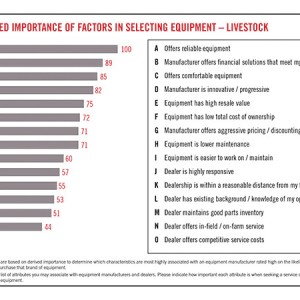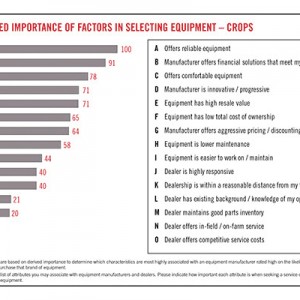Understanding what your customers want is one of the basic musts for staying in business — any business. Now, it’s also something equipment manufacturers need to keep in mind more than ever, because a new study shows a widening gap between what different producer groups want and expect from their machinery.
A 2014 survey conducted for Case IH revealed that a machinery company with just one marketing strategy isn’t going to cut it anymore. Simply put, the split in what really matters to different producers is growing too big, especially between farmers growing cash crops and those who raise livestock.
Read Also

‘No agenda, no attenda’: How to professionalize your family farm meetings
Establishing meeting ground rules can help a farm family find ways to communicate that work for the business and the family.
Case IH’s marketing group released the findings of their survey in a press release early in February. In the survey, 15 statements were put to farmers in both the livestock and cash crops sectors, and they were asked to rate each one’s importance.
Some 800 producer interviews were conducted and the results are considered to be representative of the producers that Case IH will have to target with their future marketing efforts. They include Canadian and U.S. producers from sizeable operations who have a final say or share in decision making regarding equipment selection and purchasing.
The survey presented the 15 statements to producers this way: “Below is a list of attributes you may associate with equipment manufacturers and dealers. Please indicate how important each attribute is when seeking a service or choosing a piece of equipment.”
The responses from that sample of farmers provide some interesting insights into which factors influence the machinery purchasing decisions of those two groups. What appeals most to a crop farmer in North America, according to the survey, doesn’t have similar importance to a livestock producer, and vice versa. That’s the challenge for marketing staff at the major brands, and it arises mainly from how those two producer groups use their machines.
Livestock producers use their equipment almost daily to grow feed in the summer and deliver it to herds all the way through the snow and cold of winter. Crop farmers, on the other hand, use their machines for relatively short but intensive bursts through the growing season.
From the Grainews website: AGCO unveils MT400D Series Challenger and 6600 Series MF tractors
“A big difference between livestock and crop producers when it comes to equipment is usage,” says Ryan Drollette, farm management specialist from Iowa State University extension and outreach, who commented in the Case IH press release. “Livestock producers run their equipment every single day,” he adds, “while crop producers are running them for longer periods of time during select seasons.”
But how does that fundamental difference in usage change expectations and priorities? When Case IH conducted their survey, they wanted to know what influenced farmers’ decisions in the dealership showroom. What is it that farmers look for and expect to get that convinces them to write a cheque for new equipment? That is where things really look different.
The survey showed that livestock and crop producers keep their equipment for much different lengths of time. While livestock producers will likely hold onto machines for five to 10 years, crop farmers tend to trade theirs back to the dealer much more frequently.
“The longevity of the equipment matters to the more value-oriented livestock producer,” says Brett DeVries, hay and forage product specialist at Case IH. Some of that demand for “value” from stockmen may arise from the fact it’s been a business with slim margins over the past decade — at least in Canada.
So, pricing and discounts are higher on the stockmen’s list of priorities. But, surprisingly, even though spending hard-earned money is part of this equation, the research showed it wasn’t as important as one might expect for either group. It was only of medium importance to livestock producers, while it factored right at the bottom of the crop growers’ list. In fact, it’s really not on that group’s radar at all. Not a single person in that category even acknowledged it as important.
What topped the charts in importance for livestock farmers was low maintenance. In contrast, equipment reliability is what crop producers cited as most important.
Next up for stockmen was having equipment that is easy to work on and maintain. But even though it looks like this group expects to keep their equipment longer and do a fair chunk of their own maintenance, they don’t seem bothered by the prospect of having machines down for a day or two waiting for parts. They placed the importance of having a local dealer who stocks a good parts inventory two positions lower than those in the cash crop segment.
It’s easy to see why the latter group finds that of higher importance. Their machines need to run hard and fast through short, seasonal windows of opportunity to get crops in, sprayed and harvested. So they can’t live with downtime.
And because cash crop producers trade their machines in much sooner, having equipment that is easy to work on and maintain didn’t rate very highly in their responses. Instead, having a good resale value replaced that at the number two spot on their list.
You have to look down the survey to the number three spot to find the first sign of agreement between the two groups. While each may intend to keep their machines for different lengths of time, they both expect to get some reasonably modern technology for their money. All farmers, it seems, expect the manufacturer who wins their loyalty to offer innovative and progressive features in their equipment.
The next point of agreement is at the number five spot. That’s where “having a responsive dealer” shows up on both lists. It isn’t too surprising that one rates relatively highly, but given the emphasis many individual producers and all the major brands currently put on having high-quality dealer networks, finding this statement rated at a spot that low was a bit unexpected.
“Having access to a supportive, responsive dealership is critical for all producers,” Drollette says. “An operation’s success is dependent on its ability to stay up and running, and equipment plays a crucial role in that.”
Hence my surprise that this didn’t figure more prominently.
But when it comes to what farmers expect out of their local retailer — other than the size of the local parts inventory, which I mentioned earlier — stockmen said they don’t care if the local dealer has any knowledge of how their operation functions or what it needs. That consideration was way down the list in fourteenth spot — second last in the survey question group — making for another small surprise. Their grain grower cousins, on the other hand, thought that factor was much more important. They rated it number seven.


















